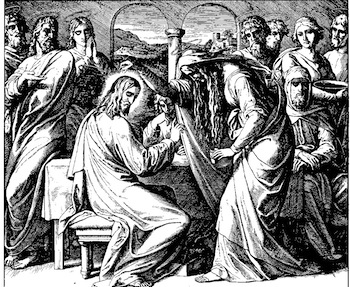Thoughts on Today’s Lessons for Sunday, June 16, 2013.
First Reading: 1 Kings 21:1-21aThe tale of selfish King Ahab and his wife Jezebel (whose infamy has made her very name an insult) crushing Naboth of Jezreel is not a pretty story! But it might have echoes in modern times, when we watch news accounts about poor workers being killed in fiery disasters in sweatshops in Bangladesh. Elijah summoned an angry God to deliver bloody justice. We might do well to call on God for a gentler justice that firmly encourages caring for the poor, the weak and the oppressed.
First Reading: 2 Samuel 11:26 – 12:10, 13-15
Do you think our bible heroes as great figures who never did wrong? Hardly! From Adam and Eve to Abraham to Moses and the prophets to Peter and the apostles, just about everyone in the book is flawed and sinful; yet God loves them and forgives them every time. King David was Israel’s greatest leader, but he was an adulterer and a murderer, too, who had the beautiful Bathsheba’s husband, Uriah, killed in battle so he could have her for himself. In this reading, God’s messenger Nathan tells David a story and tricks him into cursing and threatening with death a figure that turns out to be David himself. God spares David’s life, but learns that the child of his illicit union must die.
Psalm: Psalm 5
This psalm calls for protection from the psalmist’s enemies from an angry God who dislikes boasters, hates evildoers and destroys liars, seemingly assuming that these enemies will deserve whatever punishment God metes out. We might be more comfortable with the idea of a God of abundant love who forgives sins and welcomes all. But certainly the Psalmist’s call seems consistent with Elijah’s warning to Ahab that “dogs will … lick up your blood.”
Psalm: Psalm 32
Although modern scholars question the old tradition that King David wrote the Psalms himself, it would be easy to read today’s Psalm as David’s joy at God’s forgiveness. But God’s abundant love and forgiving spirit is not just for kings but for all God’s people. We, too, can rejoice and sing, “I will confess my transgressions to God, then you forgave the guilt of my sin. You are my hiding-place. You preserve me from trouble.”
Second Reading: Galatians 2:15-21
We continue working through Paul’s argument to the Galatians, who he feels have been misled by false teachers who came after he moved on and contradicted his ruling that Gentile converts to Christianity need not abide by Jewish law. Requiring new Christians to submit to adult circumcision and start keeping kosher kitchens would surely have cut way back on converts! To reinforce his argument, Paul declares that we are saved by new faith in Jesus Christ, not by justification through the works of the old Jewish law.
Gospel: Luke 7:36 – 8:3
This may come as a surprise, but historically, the Pharisees weren’t bad people but highly educated scholars and preachers, pillars of the synagogues. The tension between Jewish Christians and Gentiles in the early church that we see in today’s Galatians reading also colors this Gospel, which paints the Pharisee Simon as a rude host who can’t be bothered to greet his guest Jesus with customary courtesies. When the woman, who tradition sometimes recognizes as Mary Magdalene, anoints Jesus with the respect and love that the Pharisee failed to show, it is she who earns his praise and the forgiveness of her sins.

